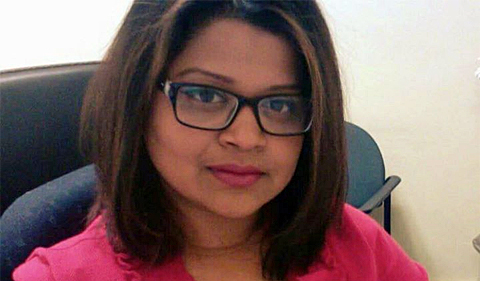
Priyadarshini Gupta, English doctoral student
Priyadarshini Gupta‘s doctoral work on literary representations of Islam in the post-9/11 world took her to the New York Public Library this summer.
A doctoral student of English, Gupta was awarded a competitive scholarship from Ohio University’s English Department, one of eight to students who are conducting research for their respective dissertations and projects.
Abstract: The summer grant helped me travel to New York City and conduct research in the Manuscripts and Archives Division at the New York Public Library. The research contributed to my dissertation on, “Islam and Global Fiction: Literary Representatives of ‘Foreigners’ and ‘Citizens’ in Post-9/11 United States.” My research focuses on how Islam has been perceived, read, and written in global Anglophone literature after the Twin Tower attacks. Since the demonization of Islam after 9/11 became commonplace in everyday life, my research takes a closer look on how literature complicates or simplifies clichéd representations of Muslims across the world.
In order to study the nuanced discussions of Islamic identity, I examined materials that dealt with the history of 9/11 attacks. I went through a range of interviews transcribed on paper or in audio tapes that listed individual accounts of how survivors dealt with the 9/11 attacks, their life after the Twin Towers collapsed, ethnic profiling after 9/11, and the ways in which the survivors held on to the American dream. Since character portrayals in novels sometimes bear close resemblance to real life, these materials helped me understand concepts of race, gender, and ethnic segregation beyond the dense critical theories written on race and ethnicity. I further found access to books, notes, and drafts of novels that dealt with concepts of Islamic fundamentalism. This helped me understand the complicated psyche that comes with idealization and practice of religious advocacy and religious performance across cultures. Comparing the notes of my dissertation chapters, the research helped me complicate ideas of race, gender, postcolonial and diasporic studies.
Examining these materials has advanced my research in numerous ways. In my dissertation, I often write how certain ethnic groups have been classified as strangers in territorial nation spaces. This research helped me find a third zone between the two extreme portrayals of ethnic minorities—one portrayal that deals with minority victimization in the United States and the other that deals with protests against such acts of discrimination. The research helped me find a third space in between two extreme categorizations. I found a new literary representation of the stranger depicted in literature; the fashionable nomadic elite who is a stranger in every culture but proves to be an asset to humanity. Since I returned from New York City, I have continued to work on the third space of stranger empowerment in my dissertation. One of my chapters primarily focuses on stranger fetish as a position of empowerment, where irrespective of trials and tribulations of being a part of an ethnic caucus in a lifetime, the stranger becomes the ideal cosmopolitan in a global community.



















Comments